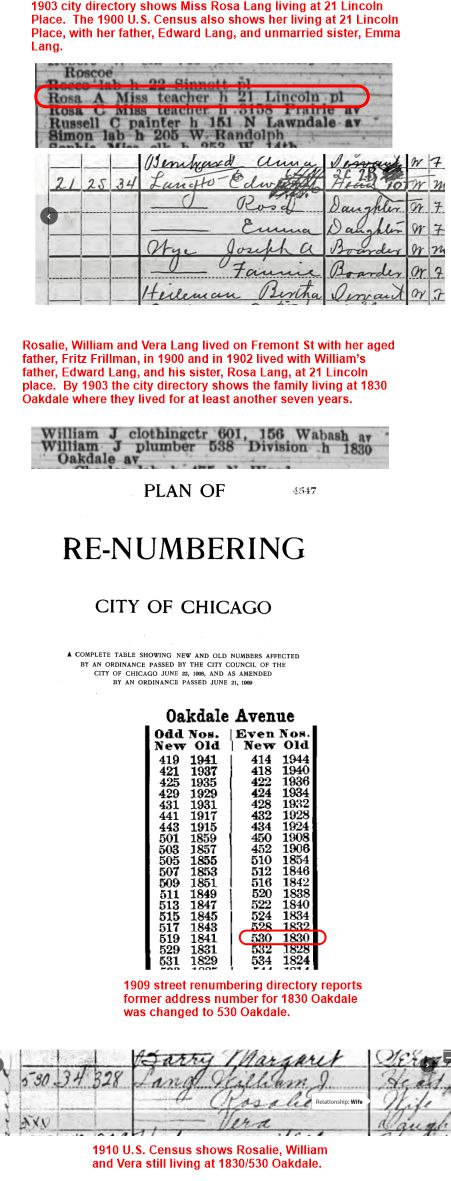|
Twenty-eight-year-old Rosalie Frillman Lang
(1876–1963) and her nine-year-old daughter Vera Lang
(1894–1967) were among the few that escaped from the
third-floor balcony at the Iroquois Theater. Of the
nearly six hundred fatalities, around three hundred came
from that balcony.
Rosalie testified at the coroner's inquest twelve days after
the fire. Nothing was reported about how she and
Vera escaped from the balcony, the far more
dangerous portion of their path. A majority of her
testimony was about their efforts to traverse
through the glass and wood doors within a few feet
of the outdoors. Rosalie and Vera were the wife and
daughter of William J. Lang (1875–1944), a plumbing
contractor. Rosalie was the daughter of German
immigrants Fritz Frillman (1824–1901) and Carolina
Siegel/Sigeler/Siegler (1832–1876). Rosalie and
William lived with her father or his most of
marriage.
|
 |
Fritz Frillman may have been
a colorful figure. In the 1860s and 1870s,
Frillman's Saloon on Chicago's north side, at the
corner of Division and Wells streets, was a meeting
place for Republican ward gatherings.
In the years after the fire
In 1917 Vera married Carl C. Rodenhausen (shortened to Roden)
(1888–1945), a plumbing pipe salesman. They had three
children, of which two survived, Carl jr and Mavis.
Rosalie and William divorced, and in the 1930s, she
moved to Detroit to live with Vera and Carl. She
spent her last years in Los Angeles.
|
|
Discrepancies and addendum
* The other three Lang/Lange parties at the Iroquois Theater were:
Lange party of eight,
Florence and Bessie Lang, and
Emma, Hortense and Irene Lange.
† A Rose by any other name...
Because the name reported for Vera's adult theater escort in
1903/04 newspapers was Rosa, one researcher believes Vera
went to the Iroquois not with her mother, Rosalia, but with
her unmarried schoolteacher aunt, who was named Rosa Lang.
Over her lifetime, Vera's mother, Rosalia Frillman Lang, was
sometimes called Rose, Rosa, Rosalie, and Rosalia, seeming
to settle on Rosalia after 1930. In the 1880 Census, she was
Rose, on her marriage license in 1893 she was Rosa, in the
1900 Census she was Rose, in the 1910 Census she went by
Rosalie, and in 1920, 1930 and 1940 Census by Rosalia. Aunt
Rosa Lang, on the other hand, was more consistently called
Rosa throughout her life, but in the 1870 and 1880 Census,
she went by Rose. Between transcription errors and
nicknames, both women were probably accustomed to being
called Rose or Rosa. The same name fuzziness is common with
women who were named Anne, Annie, and Anna or Katherine, Catherine, Kate and Kitty. Newspaper lists
of fire victims rarely included maiden names. So who was at
the Iroquois Theater with nine-year-old Vera Lang?
1903 newspapers referred to Vera as the daughter of her
escort and quoted the escort as referring to Vera as "my
daughter" and "my little girl." They referred to the escort
as Mrs., a married woman. These facts cannot alone determine
the identity of Vera's escort. Newspaper reporters in 1903
were sometimes careless about quotations. To better fit a
column space or juice up a story, quotation marks were used
with less exactitude than is acceptable by modern readers.

The strongest evidence that Vera's theater companion was her mother is that the residential address given in newspaper
stories about Rosa's fire experience —1830 Oakdale —
matches the family's address in several official
records, and also that according to multiple
sources, the aunt lived at a different address, 21
Lincoln Place. 1830 Oakdale is the address given for
Vera's family in city directories and the U.S.
Census. Significantly, it was the address Rosalia
provided when she testified before the coroner's
jury on January 12, 1904. Given current information,
I am reasonably confident that the Rosa Lang who
escaped from the Iroquois Theater with Vera Lang was
her mother, Rosalia Frillman Lang.
|
